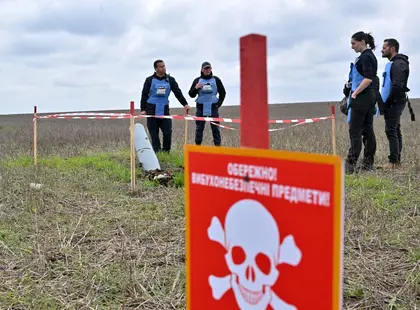Now that the sun occasionally peeks through the clouds and temperatures are slowly rising, Ukraine’s anticipation of spring has become an important factor in sustaining optimism. Along the main roads, there are billboards advertising loans to farmers for the sowing campaign. Many loans are proposed by private banks, but the state-owned Oschadbank is also offering farmers low-interest credit to finance the clearing of fields.
The front line has been relatively stationary for a while now. This has allowed demining firms to continue work and last year they surveyed more than 275,000 hectares of land. Of these, about 200,000 hectares were “returned” to agriculture.
JOIN US ON TELEGRAM
Follow our coverage of the war on the @Kyivpost_official.
De-mining goes on even in winter. More than 21,000 hectares were cleared of explosive objects in January alone. Kherson region was a particular focus of attention. Cereals and vegetables will be sown there this spring. There is no doubt, Ukraine will produce a harvest this year. The question is what will become of the produce if the harvest is too big for the domestic market.
Meanwhile, the agricultural war with European farmers continues. Since Sept. 15 last year, it has become difficult to export agricultural products through Poland, Slovakia or Hungary. Polish farmers regularly set up blockades at the Polish-Ukrainian border, while farmers from neighboring Hungary and the Slovak Republic are on standby ready to join them at any moment. They consider that the preferential conditions for Ukrainian agricultural products, introduced by the EU, are a threat to their businesses.

EXPLAINED: What We Know About Russia’s Oreshnik Missile Fired on Ukraine
The Kremlin in combat against dissenting cultural figures
While Ukraine’s agro-industry must find a way through the minefield of international trade, the Kremlin has become active on a front in which other Russians are the targets. There is now all-out war against Russian cultural figures who oppose the Kremlin’s strategy.
Nobody inside Russia speaks out against the war anymore. There is no one to fight with there. However, intellectual Russian emigres in Europe are gaining confidence and becoming more active. As after the Bolshevik revolution of 1917, we could soon see Russian emigrant publishing houses and clubs operating in Europe. “Emigrant” anti-Putin online publications are already attracting new readers.
This is probably what prompted the Kremlin to attack Dmitry Bykov and Boris Akunin – the best-known Russian writers living abroad. Their books can no longer be published or sold in Russia. This could be a serious financial blow to the authors.
Boris Akunin still has plays in Russian theaters, but he will no longer be paid royalties on ticket sales and his name has already been removed from theatre posters. The Academic Alexandrinsky Theater in St. Petersburg will continue to perform their production of 1881, which is based on Akunin’s play of the same title. Only now, the production’s artistic director will be named and paid as the author.
It is not yet clear whether Russian President Vladimir Putin’s cultural special forces will succeed in persuading millions of Russians to abandon their favorite writers. But the effort to combat dissenting cultural celebrities will continue.
Books by another iconic Russian writer, a candidate for the Nobel Prize for Literature, Lyudmila Ulitskaya, are being withdrawn from sale. Russian universities have revoked her honorary professorships, while media channels are working diligently to portray Ulitskaya as one of Russia’s greatest enemies.
Writers are not the only group to suffer from the Kremlin’s new campaign. The cult Russian rock band BI-2 recently arrived in Thailand to perform for the many Russian citizens who live there now. The musicians, however, did not ask permission from the Thai authorities to hold the concert and they were detained for that and for failing to pay taxes on ticket sales.
Russian diplomats demanded the immediate deportation of the musicians to Russia, where they would face prison for their anti-war speeches. Fortunately, the musicians hold Israeli as well as Russian passports. The sharp deterioration in Israeli-Russian relations since the Kremlin sided with Hamas probably played a role in this story. After intervention by Israeli diplomats, the musicians were sent to Tel Aviv instead of Moscow. Now they will enjoy an early Israeli spring, rather than the ongoing, Kremlin-induced, cultural winter, which will no doubt continue in Russia even after the warmer weather arrives.
Russian authorities against the families of mobilized soldiers
In Russia itself, where nobody openly opposes the war with Ukraine, the authorities are fighting with the wives and mothers of Russian soldiers. These women have “had the audacity” to unite in an organization called “The Way Home.” They demand that their men be demobilized from the army and others mobilized in their place.
These women are neither against the war nor against Putin. They do not make speeches at all. They place carnations tied with white ribbons on monuments to the unknown soldier, take photographs of these carnations, and post them on social networks. They even write letters to Putin asking for the demobilization of their menfolk. For these peaceful actions, they are detained, and fined.
Russia’s chief propagandists speak out on television against the women, calling them traitors and accomplices of Ukraine. The police also detain journalists who come to photograph the “protest” laying of carnations. The authorities do not want information about this movement to provoke other wives and mothers of soldiers to do the same. Mobilization in Russia will continue and there will be no demobilization any time soon.
The views expressed are the author’s and not necessarily of Kyiv Post.
You can also highlight the text and press Ctrl + Enter






